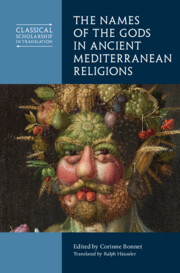Book contents
- The Names of the Gods in Ancient Mediterranean Religions
- Classical Scholarship in Translation
- The Names of the Gods in Ancient Mediterranean Religions
- Copyright page
- Dedication
- Contents
- Figures
- Tables
- Contributors
- Acknowledgements
- Foreword
- Abbreviations
- Introduction In the Mirror of Vertumnus
- Chapter 1 ‘To the Immortals Everything Is Possible’
- Chapter 2 All Sides of the Moon
- Chapter 3 ‘May the Force Be With You!’
- Chapter 4 Dionysos in the Mirror of Poseidon
- Chapter 5 Lord of the Universe, the World and Eternity
- Chapter 6 This Is Not a Name
- Chapter 7 The Sword and the Patera
- Chapter 8 A Travelling Portrait
- Chapter 9 Pantheus, a ‘Total’ God in the Greek and Roman World
- Chapter 10 ‘I Will Be Who I Will Be’ (Exod. 3:14)
- Chapter 11 Golden Locks Among the Greeks, or the Hair Secrets of the Beautiful Apollo
- Chapter 12 Athena – Artemis
- Epilogue
- Bibliography
- Index
Introduction - In the Mirror of Vertumnus
Published online by Cambridge University Press: 23 February 2024
- The Names of the Gods in Ancient Mediterranean Religions
- Classical Scholarship in Translation
- The Names of the Gods in Ancient Mediterranean Religions
- Copyright page
- Dedication
- Contents
- Figures
- Tables
- Contributors
- Acknowledgements
- Foreword
- Abbreviations
- Introduction In the Mirror of Vertumnus
- Chapter 1 ‘To the Immortals Everything Is Possible’
- Chapter 2 All Sides of the Moon
- Chapter 3 ‘May the Force Be With You!’
- Chapter 4 Dionysos in the Mirror of Poseidon
- Chapter 5 Lord of the Universe, the World and Eternity
- Chapter 6 This Is Not a Name
- Chapter 7 The Sword and the Patera
- Chapter 8 A Travelling Portrait
- Chapter 9 Pantheus, a ‘Total’ God in the Greek and Roman World
- Chapter 10 ‘I Will Be Who I Will Be’ (Exod. 3:14)
- Chapter 11 Golden Locks Among the Greeks, or the Hair Secrets of the Beautiful Apollo
- Chapter 12 Athena – Artemis
- Epilogue
- Bibliography
- Index
Summary
Giuseppe Arcimboldo was born in Milan around 1527 and after 1562–1563, having completed his training in Lombardy, he became a court artist in the service of the Habsburgs, successively under the emperors Ferdinand I, Maximilian II and Rudolf II, probably in Prague and then in Vienna. As the royal family’s portraitist, he assured his remuneration by producing completely classical canvases in the conventional style that reflected an official art form. At the same time, Arcimboldo produced some rather surprising works: composite heads and hybrid metamorphoses of the human face in which deception and illusion triumphed. With Arcimboldo blurring human perceptual reference points, his contemporaries referred to his canvases as scherzi, grilli and capricci, ‘jokes’, ‘caprices’ and ‘grotesques’, a marvellous and confusing mixture of genres. Still fascinated by these paradoxical, neither beautiful nor ugly, virtuoso and unusual portraits, our contemporaries call it ‘Mannerism’.
- Type
- Chapter
- Information
- Publisher: Cambridge University PressPrint publication year: 2024

